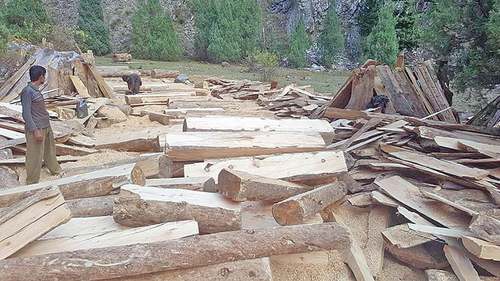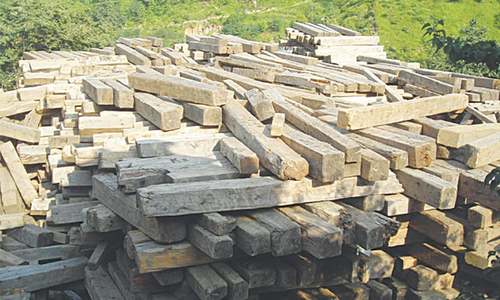THE illegal cutting and commercial exploitation of glaciers within the regions of Dir, Chitral, Swat, Shangla, Kaghan, Naran, and other parts of Khyber Pakhtunkhwa pose a significant threat to the ecological and climatic stability of the province. These activities are in direct violation of the environmental protection statutes and regulations governing KP.
With over 7,000 known glaciers, Pakistan forms the largest mass of ice outside the polar regions. Northern Pakistan, crisscrossed by the Karakoram, Himalayan, and Hindu Kush mountain ranges, is a landscape carved out of ice and rock. These glaciers provide much-needed irrigation to local communities, acting as the lifeblood of civilisation in the north. Local communities have developed intricate systems of canals to utilise glacier meltwater for crop irrigation.
However, climate change has profoundly affected Pakistan, leading to rapidly rising temperatures and melting snow, which cause massive flooding, devastating villages and leading to frequent drownings. Like many alpine areas worldwide, glaciers in Pakistan are receding.
KP is home to approximately 3,050 glaciers, primarily located in its northern regions. These glaciers are crucial for the region’s water resources and ecological balance. It has come to light that certain individuals and entities are engaged in the unauthorised extraction and transportation of glacier ice for commercial purposes, cutting glaciers into large blocks. This exploitation causes the rapid depletion of these critical natural resources.
Local sources report that during the past few years, especially during Ramazan, 200 to 300 mini-trucks loaded with ice blocks were transported daily from Upper Dir to other parts of Dir, Bajaur, Malakand, and even Mardan District. The local population remains largely unaware of the glaciers’ importance to their area’s ecological system.
Like many alpine areas worldwide, glaciers in Pakistan are receding.
Ironically, despite Pakistan’s obligations under international environmental laws, no specific legislation addresses glacier protection at the national or provincial levels. The Environmental Protection Act of 1997, the Khyber Pakhtunkhwa Environmental Protection Act of 2014, and the Climate Change Act of 2017 do not mention glaciers. This legal void is alarming, given the critical role glaciers play in the region’s ecological and climatic stability.
In 2010, lawmakers in Argentina passed the world’s first national glacier protection law, which prohibits mining, industrial activities, and other harmful activities near glaciers in the country. In January 2024, the parliament of Tajikistan also passed a law for the protection of glaciers.
Keeping in view the situation, Pakistan, especially the provincial assembly of KP as well as the legislative assembly of Gilgit-Baltistan, needs to pass glacier protection and preservation laws immediately to stop further damage.
The unauthorised cutting of glaciers constitutes a clear violation of environmental protection laws and regulations in force within KP. These actions require immediate investigation and enforcement of the relevant legal penalties against the perpetrators. The depletion of glaciers disrupts the fragile ecological balance, adversely affecting local flora and fauna. The loss of these glaciers undermines efforts to preserve biodiversity and protect endangered species within these regions. Glaciers play an essential role in regulating Earth’s climate by reflecting solar radiation and maintaining the global temperature balance. The reduction of glacier mass accelerates global warming and climate change, leading to severe consequences for weather patterns, agricultural productivity, and human health.
These glaciers serve as important freshwater reservoirs. Their degradation will result in a significant decrease in water availability for local communities, agricultural activities, and wildlife, thereby threatening food security and livelihoods. The natural beauty and unspoiled environment of these regions attract a substantial number of tourists, contributing significantly to the local economy. The destruction of glaciers will adversely affect tourism, leading to economic losses for communities that depend on this sector. Pakistan is a signatory to the Paris Agreement and several other international laws on climate issues and environmental protection, which mandate the protection of our glacier reserves.
The United Nations Framework Convention on Climate Change, along with its subsequent protocols and agreements such as the Kyoto Protocol and the Paris Agreement, commits parties to reduce greenhouse gas emissions and combat climate change, which directly impact glacier melt and preservation.
Article 2 of the Paris Agreement aims to limit global warming to well below two degrees Celsius, with efforts to limit the increase to 1.5°C, a critical target for reducing the rate of glacier melting. The Convention on Biological Diversity promotes the conservation of biological diversity, the sustainable use of its components, and fair and equitable sharing of benefits arising from genetic resources. Article 8 of the CBD emphasises in-situ conservation, including protecting ecosystems and natural habitats such as glacier regions to maintain viable populations of species in their natural surroundings.
The United Nations Convention to Combat Desertification addresses land degradation and desertification, including protecting water sources and glaciers that contribute to regional hydrological stability. Articles 10 and 11 of the UNCCD focus on national action programmes and strategies to combat desertification and promote sustainable land management practices.
The United Nations 2030 Agenda for Sustainable Development includes 17 SDGs, several relevant to glacier protection. SDG 13 (climate action) asks countries to take urgent action to combat climate change and its impacts, which includes the preservation of glaciers. SDG 15 (life on land) promotes the sustainable management of forests, combating desertification, halting and reversing land degradation, and stopping biodiversity loss, indirectly supporting glacier conservation.
The authorities need to protect these precious reserves of glaciers and conduct a comprehensive investigation into illegal glacier-cutting activities, identifying and prosecuting those responsible in accordance with the law. They must strictly enforce existing environmental protection laws and regulations to prevent further illegal exploitation of glaciers. Launching awareness campaigns to educate local communities and stakeholders about the long-term environmental and economic consequences of glacier depletion is essential. Furthermore, promoting and supporting sustainable practices that ensure the conservation and protection of glaciers for future generations is crucial.
Both the KP and federal governments are under obligation to pass laws for the protection and preservation of glaciers.
The writer is an environmental lawyer.
Published in Dawn, July 13th, 2024














































Dear visitor, the comments section is undergoing an overhaul and will return soon.